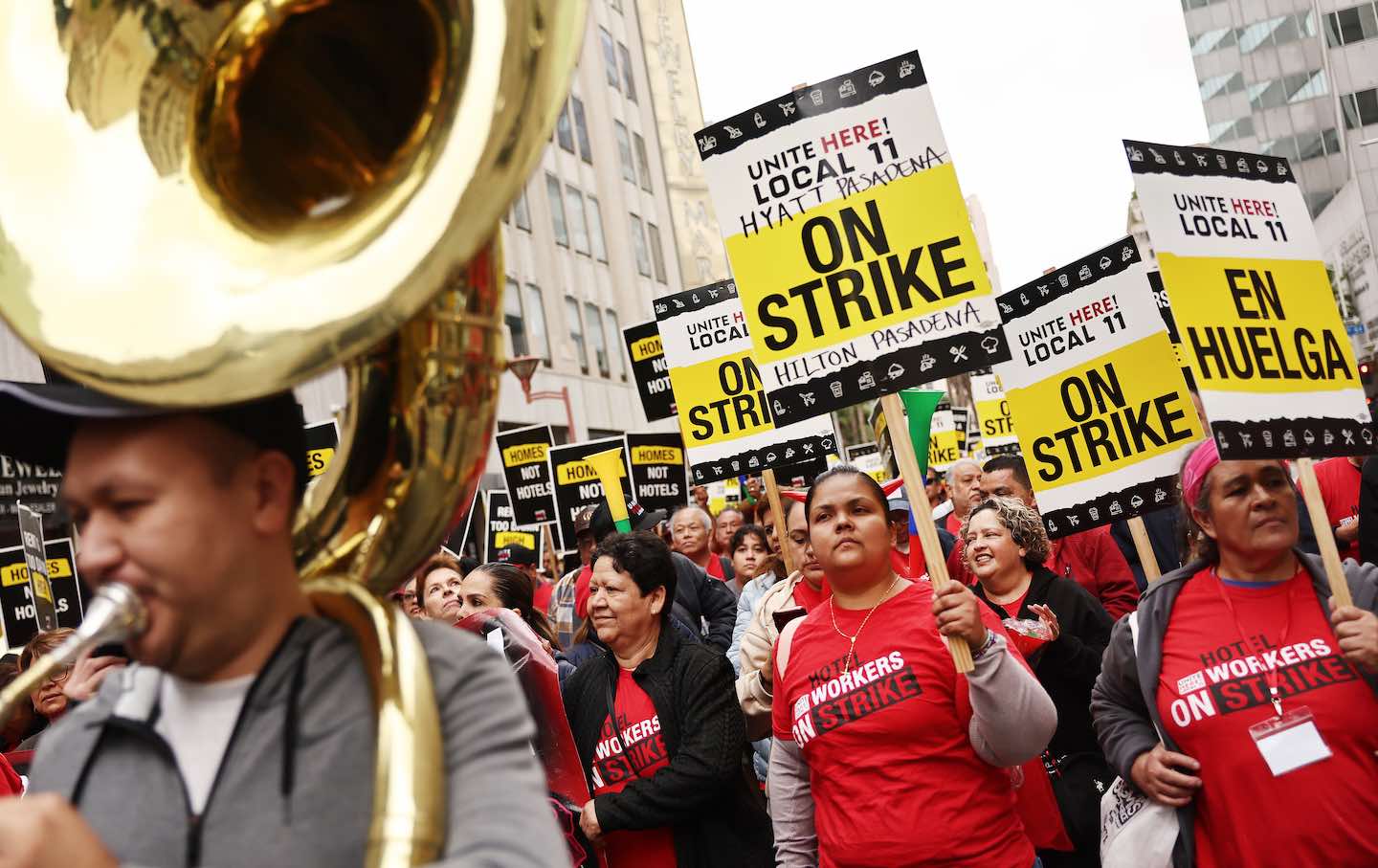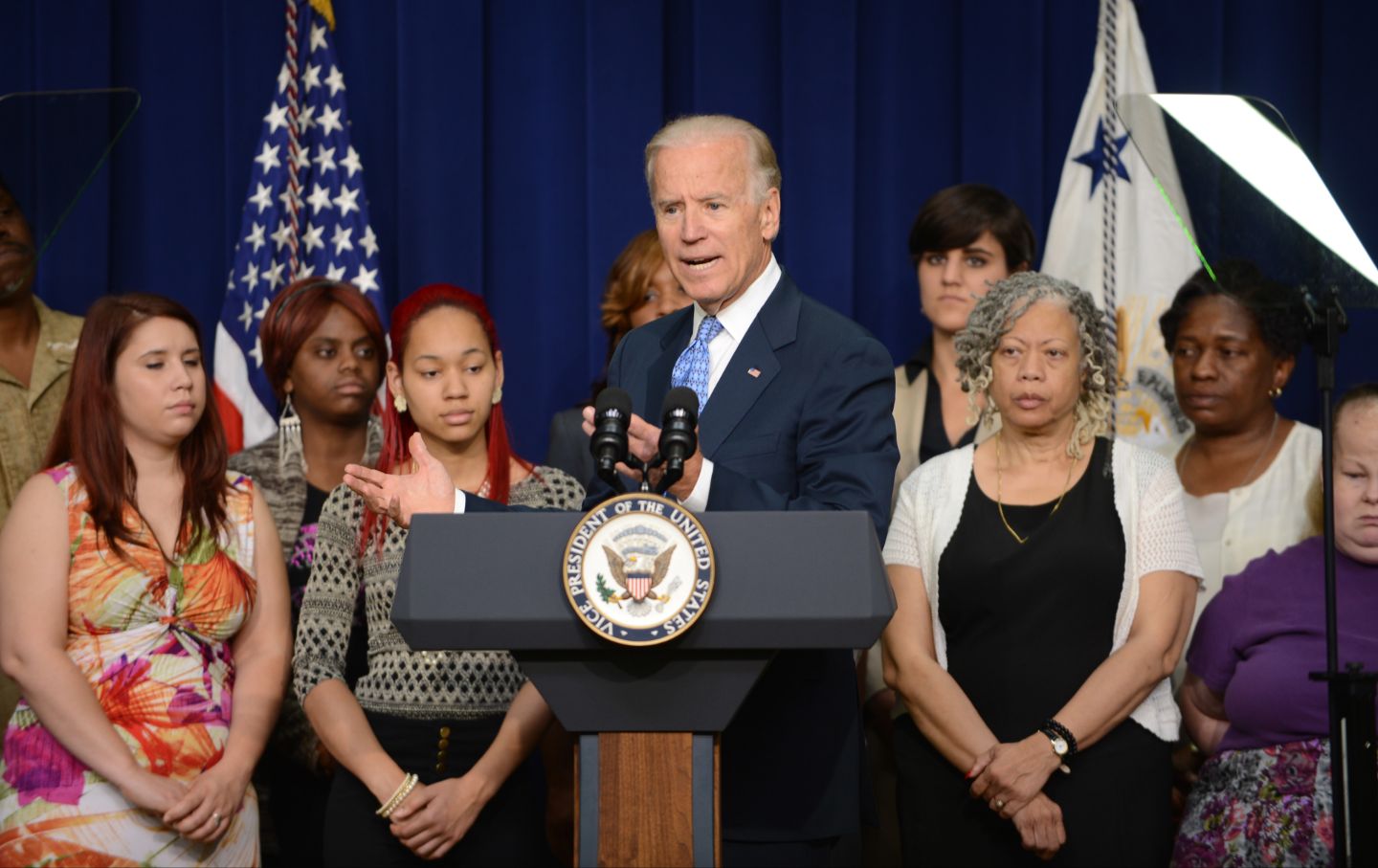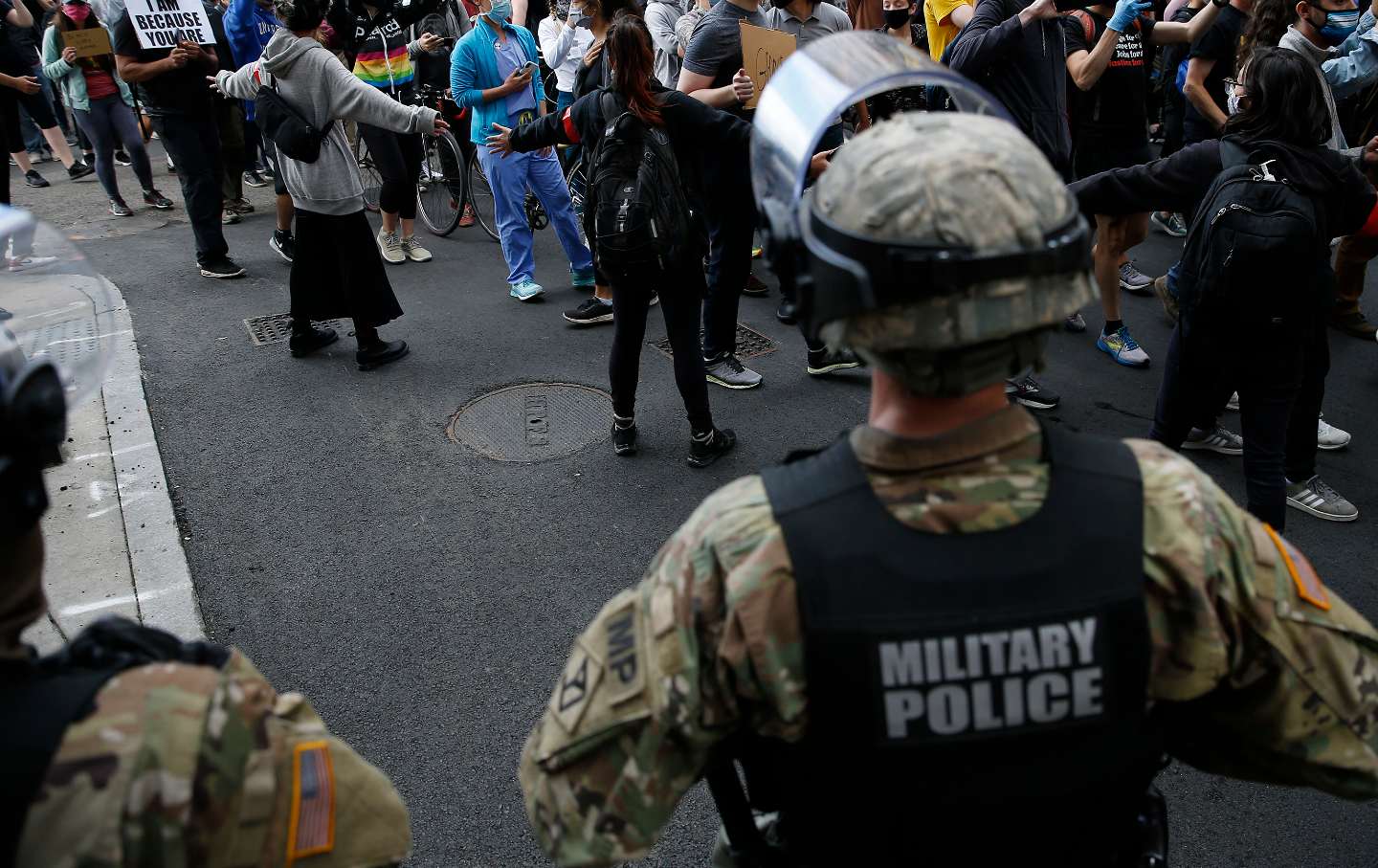
Hotel workers with Unite Here Local 11 march through downtown LA on October 25, 2023.
(Mario Tama / Getty Images)Months after the end of the screenwriters’ and actors’ strikes, another Los Angeles labor action continues apace. The city’s forgotten strike is that of the hotel workers organized by Unite Here! Local 11, who have been engaged in a series of rolling strikes against dozens of LA-region hotels. Even as workers’ contracts have expired, the hotels have balked at agreeing to new contracts with union negotiators.
In recent weeks, an increasing number of owners have cried uncle and settled with their workers, agreeing to improved pay rates, better benefits packages and stronger worker protection measures. As of this week, thirty-four hotels have agreed to new contracts, which include a $5-per-hour initial pay increase, translating to a 20 percent hike in wages, and a cumulative pay increase of $10 per hour by 2027 for room attendants, cooks, and other non-tipped workers. The hotels also agreed to continue paying the vast majority of health insurance premiums for employees and their families, with the workers themselves not having to pay more than $20 per month.
This continues an emphasis that Local 11—one of a slew of progressive, activist, service-sector unions that have risen to the forefront of labor organizing in Los Angeles, Las Vegas, and other western cities in recent years—has placed on winning not just better wages, but, equally importantly, better benefits: since 2018, the union has secured pension contribution increases from the hotels totaling 600 percent. As a result, their pension fund is one of America’s best funded for service workers. They have also pushed for equitable hiring opportunities for people with criminal justice convictions, and for increased protections for immigrant workers. Cumulatively, this package represents an extraordinary win for labor in the country’s second-largest city.
Many other hotels, however, including well-known Downtown hotels such as the Hotel Figueroa, have, so far, refused to settle with the union. In February, more than one hundred non-unionized food and beverage operators who were trying to unionize were fired at the Figueroa. That same month, several striking workers were shot at with ball bearings by unknown assailants, as they walked the picket line outside the hotel—one was hit in the head. In the wake of these developments, Local 11 called for a boycott of the hotel. They also called for a boycott of the Maya Hotel, in Long Beach, which has also seen violence against striking workers.
“We’ve been doing this fight for eight months now,” says Nohelia Gonzalez, 52, who has worked as a housekeeper at the Figueroa for the past three years. “The hotel knows what’s been going on, that we’ve fighting for this contract for months now, and they’ve chosen not to listen to us.”
The union is particularly incensed about the firing of the non-unionized workers and has asked the city’s district attorney to open an investigation to determine whether the action violates the new Los Angeles Hotel Workers’ Retention Ordinance. This measure came out of the pandemic, putting in place protections for temporarily laid-off workforces so that they would be rehired as the hotels bounced back from the pandemic closures. Local 11 alleges that the hotel closed the restaurant on February 11 and reopened two days later with brand new workers, thus doing an end-run around the unionization efforts.
For Gonzalez, this speaks to a broader issue: what the union sees as management’s disregard for the basic needs of its workforce. One of the union’s biggest complaints is that workers are paid too little to allow them to afford housing, in LA’s expensive housing market, that is near their place of employment. Gonzalez herself commutes two hours each way, on two busses and the LA Metro, from her $2,250 per month rental unit. On the $24 per hour that she currently earns—a wage that in some states generates at least a degree of economic stability, but in California doesn’t allow workers to build up savings and security—she can’t afford to pay the higher rents that landlords charge nearer the center of the city.
“So we’re going to continue to fight,” Gonzalez says. The union is, according to spokesperson Maria Hernandez, urging would-be customers at the Figueroa “not to eat, sleep, party, spend money, patronize the hotel until a contract is signed, workers are brought back, and there’s an end to the violence.”
We cannot back down
We now confront a second Trump presidency.
There’s not a moment to lose. We must harness our fears, our grief, and yes, our anger, to resist the dangerous policies Donald Trump will unleash on our country. We rededicate ourselves to our role as journalists and writers of principle and conscience.
Today, we also steel ourselves for the fight ahead. It will demand a fearless spirit, an informed mind, wise analysis, and humane resistance. We face the enactment of Project 2025, a far-right supreme court, political authoritarianism, increasing inequality and record homelessness, a looming climate crisis, and conflicts abroad. The Nation will expose and propose, nurture investigative reporting, and stand together as a community to keep hope and possibility alive. The Nation’s work will continue—as it has in good and not-so-good times—to develop alternative ideas and visions, to deepen our mission of truth-telling and deep reporting, and to further solidarity in a nation divided.
Armed with a remarkable 160 years of bold, independent journalism, our mandate today remains the same as when abolitionists first founded The Nation—to uphold the principles of democracy and freedom, serve as a beacon through the darkest days of resistance, and to envision and struggle for a brighter future.
The day is dark, the forces arrayed are tenacious, but as the late Nation editorial board member Toni Morrison wrote “No! This is precisely the time when artists go to work. There is no time for despair, no place for self-pity, no need for silence, no room for fear. We speak, we write, we do language. That is how civilizations heal.”
I urge you to stand with The Nation and donate today.
Onwards,
Katrina vanden Heuvel
Editorial Director and Publisher, The Nation








